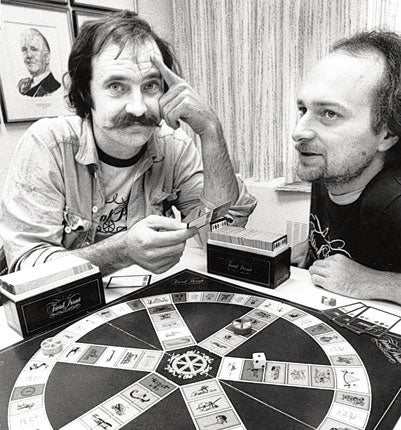Chris Haney: Co-creator of Trivial Pursuit

Your support helps us to tell the story
From reproductive rights to climate change to Big Tech, The Independent is on the ground when the story is developing. Whether it's investigating the financials of Elon Musk's pro-Trump PAC or producing our latest documentary, 'The A Word', which shines a light on the American women fighting for reproductive rights, we know how important it is to parse out the facts from the messaging.
At such a critical moment in US history, we need reporters on the ground. Your donation allows us to keep sending journalists to speak to both sides of the story.
The Independent is trusted by Americans across the entire political spectrum. And unlike many other quality news outlets, we choose not to lock Americans out of our reporting and analysis with paywalls. We believe quality journalism should be available to everyone, paid for by those who can afford it.
Your support makes all the difference.A 1979 game of Scrabble led Chris Haney, picture editor of the Montreal Gazette, and his friend Scott Abbott, a sports journalist with the Canadian Press news agency, to come up with their own board game. Trivial Pursuit, launched two years later, was described by Time magazine as "the biggest phenomenon in game history".
The pair wanted to create an alternative to Scrabble and, within an hour, devised a game with a six-spoked, circular board and six categories of trivia question, each designated by a coloured segment – arts and literature (brown), science and nature (green), entertainment (pink), geography (blue), history (yellow) and sports and leisure (orange). Participants would win the relevant coloured, pie-shaped wedge on getting a correct answer – and then aim to get a complete set of six.
Haney, who stood at more than 6ft tall, wore jeans, smoked and had a habit of twirling his handlebar moustache, hoped that commercial success would enable him to finance travels to Europe by ship, because he had a fear of flying. The success of the game far outstripped his initial ambition: Trivial Pursuit had sold more than 100 million units by the time Hasbro paid $80m to buy the rights to the game in 2008.
Born in Welland, Ontario in 1950, Haney dropped out of high school at the age of 17. His father, a radio newsreader, helped him to find a job in the picture department of the Canadian Press.
In 1975, Haney was assigned to its Montreal bureau to organise coverage of the 1976 Olympics. There he met Abbott, who three years later sketched out the idea for their board game when Haney, by then working for the Montreal Gazette, decided it should be about trivia. Haney's idea for the title was Trivia Pursuit, but his first wife, Sarah – with whom he had three children – suggested adding an "l".
Haney and Abbott took on two partners, Haney's brother John and a lawyer friend Ed Werner, and, to finance the manufacture and distribution, they sold shares to 32 people. Haney, who was known as "Horn", soon gave up his newspaper job and, with his brother, wrote 6,000 questions.
Their business, Horn Abbott, launched Trivial Pursuit in Canada in November 1981. The following year, the game was marketed in the US and it soon became a worldwide success. The original Genus Edition was followed by the Silver Screen Edition, with questions solely about films.
The entrepreneurs survived two legal challenges to their idea. In 1984, Fred L Worth, an American air traffic controller-turned-author, unsuccessfully tried to sue, claiming that many questions and answers were taken from his books, The Trivia Encyclopedia (1974), The Complete Unabridged Super Trivia Encyclopedia (1977) and Super Trivia Vol II (1981).
Worth was convinced that he would win the case because a deliberately wrong answer in those books – planted for the very purpose of catching out plagiarists – appeared in Trivial Pursuit. "What's Columbo's first name?" the board game asked about the television detective, giving the incorrect answer as "Philip". However, the lawsuit never came to trial, thrown out by Southern California's federal district court on the grounds that the defendants admitted using Worth's books – and many others – to find their questions and answers. The court decided that this was acceptable research, as opposed to one single source being plagiarised.
In 1988, following an appeal, the US Supreme Court ruled that Trivial Pursuit was "substantially different" from Worth's books because the game's facts were presented in categories on randomly picked cards, whereas the books listed them alphabetically.
Haney, Abbott and their business partners also survived a 1994 claim by a Canadian who said that he had outlined the trivia game idea to Haney when given a lift as a hitchhiker. Legal wrangling continued for 13 years, until the Nova Scotia Supreme Court finally threw out the lawsuit.
In 1990, Haney – who enjoyed playing golf – invested some of his profits into the Devil's Pulpit in Ontario, which became one of Canada's top golf courses. Two years later came another course, the Devil's Paintbrush.
Until his death, Haney enjoyed spending winters in Marbella, latterly with his second wife, Hiam.
Anthony Hayward
Christopher Haney, newspaper picture editor and board-game inventor: born Welland, Ontario 9 August 1950; married twice (two sons, one daughter); died Toronto 31 May 2010.
Join our commenting forum
Join thought-provoking conversations, follow other Independent readers and see their replies
Comments